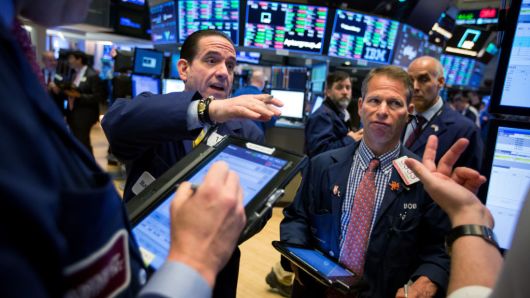
Stocks snapped a four-day winning streak Thursday after a report said President Donald Trump would support moving ahead with additional tariffs on Chinese imports as early as next week.
Wall Street also looked ahead to a U.S.-Canada trade deal deadline set for Friday.
The Dow Jones Industrial Average dropped 137.65 points to 25,986.92 while the S&P 500 fell 0.4 percent to 2,901.13. The Nasdaq Composite declined 0.3 percent to 8,088.36 after reaching a record high. The indexes also closed lower for the first time in five sessions.
Bloomberg News reported that Trump told aides he supports moving forward with proposed tariffs on an additional $200 billion in Chinese goods. The report also said, however, that Trump has not made up his mind on the matter. The White House declined to comment on the report.
Trade-sensitive stocks such as Boeing and Caterpillar hit their session lows following the report’s release. Shares of Boeing and Caterpillar dropped 0.9 percent and 2 percent, respectively.
Strategists had told CNBC that the additional tariffs were the biggest risk for the market heading into September. Phil Blancato, CEO of Ladenburg Thalmann Asset Management, called U.S.-China trade relations “the unknown” in the market.
Investors also watched as the U.S. and Canada tried to strike a deal on trade.
“We had some momentum when the U.S and Mexico struck a deal earlier in the week,” said Ryan Nauman, market strategist at Informa Financial Intelligence. “But as the deadline approaches, people are getting a bit worried.”
Canada has until Friday to join a trade deal made between the U.S. and Mexico, according to Trump. However, Trump said he was confident an agreement between the two nations was within reach. “I think Canada very much wants to make the deal,” Trump told reporters on Wednesday. “It probably won’t be good at all if they don’t.”
Mexico and the U.S. announced a bilateral trade deal on Monday, paving the way for a NAFTA replacement. Both countries also left the door open for Canada to join the agreement.
Trade worries had kept a lid on stock gains in recent months as investors assessed the potential impact of protectionist trade policies on the global economy.
But while progress on trade is a net positive for stocks, there are still risks facing investors, said Larry Benedict, CEO of The Opportunistic Trader.
“There are some divergences between the U.S. and the rest of the world,” Benedict said. “If you look at European and Asian markets, … a lot of them” are down for the month while U.S. shares are up sharply in that time. Benedict also said he expects volatility to pick up once September starts as more traders return from vacation.
Emerging-market stocks fell broadly on Thursday as a stronger dollar sent the Turkish lira and the Argentine peso down sharply. The iShares Emerging Markets ETF (EEM) dropped 2.6 percent. The lira fell 3 percent to 6.66 per dollar, while the peso dropped more than 10 percent to a record low.
“EM is weak over concerns about Turkey and Argentina,” said Michael Shaoul, chairman and CEO of Marketfield Asset Management. “That’s spilling over a bit into U.S. trading, but the moves in the U.S. are rather small.”
U.S. investors came into Thursday’s session after Chinese stocks led a generally weak session in Asia. The Shanghai Composite dropped 1.1 percent, while the Nikkei 225 rose marginally.
The Cboe Volatilty Index, widely considered the best fear gauge in the market, rose to its highest level since Aug. 17.
Jobless claims rose slightly to 213,000 last week, but remained near multi-decade lows as the underlying trend still points to a tightening labor market. Personal income rose 0.3 percent in July.
Shares of Electronic Arts plunged more than 9.5 percent after the video-game company delayed the release of “Battlefield V,” a popular game, and adjusted its fiscal 2019 guidance for net bookings.

